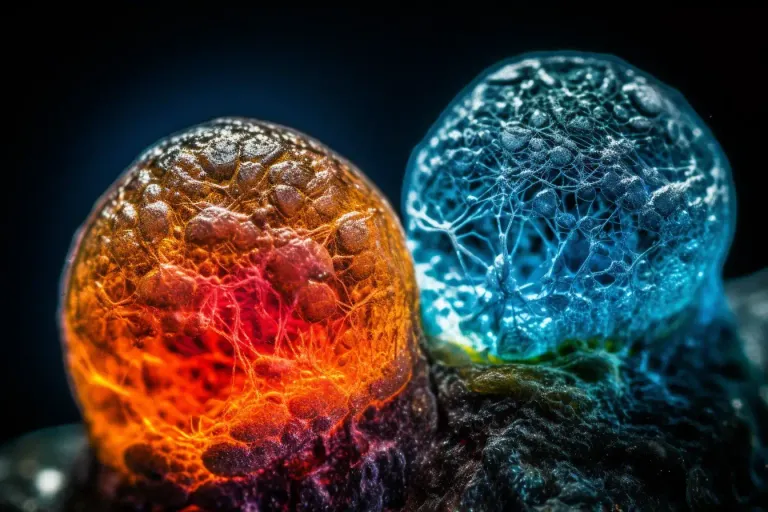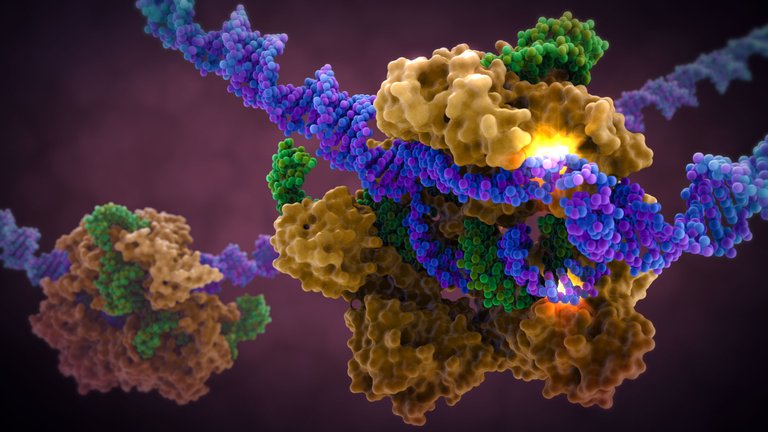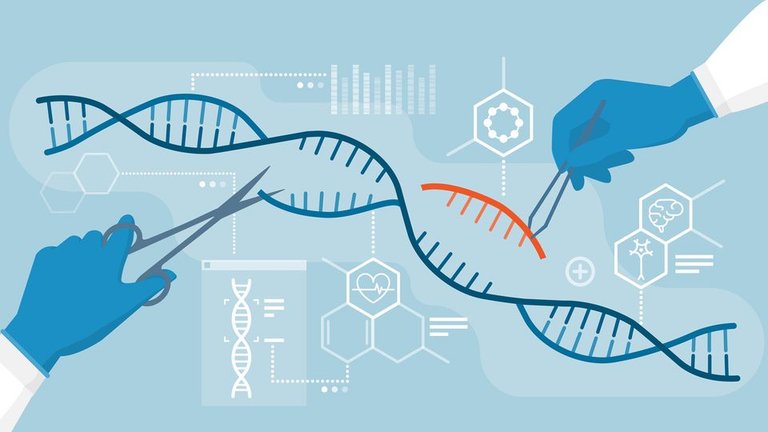I'm here in my thirties, thinking that it's great to be living the healthiest moment of my life, in the greatest stability I've ever achieved, and morbidly thinking that the decline of this state is inherent, and that, more or less homogeneously, the tendency is for me to be in what we call "mid-life". It's a difficult subject for me, always. It's not necessarily healthy to create beliefs and expectations about anything, so I try not to create false hopes about the extension of life through science for a period as short as these next few decades, but like a religious person who believes in god, I have my faith that science is the only way. That being the case, I can only hope, however dubious and fragile, for a possible extension of my existence. To do this, I need to delve a little into these concepts in order to bring logical information to you.

It's no news that Artificial Intelligence is probably the greatest advent of the century (and we haven't even touched its most superficial layers yet). And at the end of the day, it is through it that we will achieve previously unimaginable answers. It's worth taking a look at where we are and where we can go with this broad concept. Cell renewal through technology encompasses several areas of research, including stem cell therapy, tissue engineering, gene editing and AI-assisted regenerative medicine. Stem cells, for example, with their ability to differentiate into various types of cells, have been the main focus in many sub-areas of medicine. Stem cell-based treatments are already in clinical use for some conditions, such as spinal cord injuries and certain types of blood cancer. The creation of organs and tissues in the laboratory has progressed significantly. Bioengineered structures such as bladders and tracheas have already been successfully implanted in patients. The development of more complex organs, such as the heart and liver, is in advanced experimental stages.
CRISPR-Cas9 technology deserves a separate paragraph in this text, as it is in my opinion one of the most promising topics involving Artificial Intelligence. The CRISPR-Cas9 system (Clustered Regularly Interspaced Short Palindromic Repeats and CRISPR-associated protein 9) represents a revolutionary advance in genetic engineering. Originally discovered as an immune defense mechanism in bacteria, CRISPR-Cas9 has been adapted for precise genomic editing in a wide range of organisms, including human cells. Some of the applications of this tool are:
Monogenic Diseases:
- Sickle cell anemia: Correction of the β-globin mutation (HBB gene).
- Experiments on human hematopoietic stem cells have shown efficient correction (>25%) of the causative mutation.
Duchenne Muscular Dystrophy:
- Removal of mutated exons in the dystrophin gene.
- Studies in animal models have shown partial restoration of muscle function.
Cystic Fibrosis:
- Correction of the ΔF508 mutation in the CFTR gene.
- In vitro experiments showed partial restoration of chloride channel function.

CRISPR-Cas9 technology has opened up a new horizon in genetic engineering, offering unprecedented possibilities for mutation correction and cell reprogramming. Although technical and ethical challenges remain, we will see increasingly sophisticated clinical applications, potentially revolutionizing the treatment of genetic diseases and regenerative medicine. Mainly because machine learning algorithms are being applied to analyze large genomic and proteomic data sets, identifying new targets for regenerative therapies and optimizing cell differentiation protocols.
But to be realistic, at the end of the day, what we might see in the next fifteen years is personalized medicine becoming more advanced, being able to map a person's genetic and epigenetic profile, as well as their metabolic profile, in a more complex and comprehensive way, in order to create a personalized health roadmap for them. We will most likely see progress in the development of nano-technologies used for cell repair, and this is where we come up against "anti-aging" and the possibilities of preventing early physical decline. There's also the predictability of disease development through algorithms, more efficient bio-printing. I think that in ethical terms, the only sad thing in this story is the limitation regarding accessibility and equity, which as always will follow the order of priority of "from the richest to the poorest". Everything else is nonsense in my view, such as ethical questions about extending life, avoiding death, blah-blah-blah.

Many topics remain open when we open up this cosmic palette of possibility, such as: the effect of increased life expectancy on the economy (and the retirement age), the change in the job market (how long do you have to work?), new industries involving advancing health technology, demographic challenges, and so on. This is all just a glimpse, a casual chat about the hypotheses, but I hope it has served as a glimpse of the near future. What do you think?
Thanks for reading!

Português
Estou aqui com meus trinta e seis anos, pensando que é muito bom viver o momento mais saudável da minha vida, na maior estabilidade que já alcancei e morbidamente pensando que é inerente o declínio desse estado, e que de forma mais ou menos homogênea, a tendência é que eu esteja no que chamamos de "metade da vida". É um tema difícil para mim, sempre. Não é necessariamente saudável criar crenças e expectativas em qualquer coisa, então eu tento não criar falsas esperanças a respeito do prolongamento da vida através da ciência para um prazo tão curto como essas próximas décadas, mas tal qual um religioso que acredita em deus, eu tenho minha fé de que a ciência é o único caminho. E sendo assim, me resta ter esperanças ainda que dúbias e frágeis sobre uma possível expansão da minha existência. Para isso, preciso mergulhar um pouco nesses conceitos para trazer informações lógicas até vocês.
source

Não é novidade que a Inteligência Artificial é provavelmente o maior advento do século (e ainda nem esbarramos nas suas camadas mais superficiais). E no final das contas, é através dela que iremos alcançar respostas até então inimagináveis. Vale a pena fazer um panorama sobre como estamos e para onde podemos ir com este amplo conceito. A renovação celular através da tecnologia engloba várias áreas de pesquisa, incluindo terapia com células-tronco, engenharia de tecidos, edição genética e medicina regenerativa assistida por IA. As células-tronco, por exemplo, com sua capacidade de se diferenciar em vários tipos de células, têm sido o foco principal em muitas sub áreas da medicina. Tratamentos baseados em células-tronco já estão em uso clínico para algumas condições, como lesões da medula espinhal e certos tipos de câncer do sangue. A criação de órgãos e tecidos em laboratório tem progredido significativamente. Estruturas como bexigas e traqueias construídas com bioengenharia já foram implantadas com sucesso em pacientes. O desenvolvimento de órgãos mais complexos, como coração e fígado, está em estágios experimentais avançados.
A tecnologia CRISPR-Cas9 merece um parágrafo a parte nesse texto, por que é ao meu ver um dos temas mais promissores envolvendo Inteligência Artificial. O sistema CRISPR-Cas9 (Clustered Regularly Interspaced Short Palindromic Repeats and CRISPR-associated protein 9) representa um avanço revolucionário na engenharia genética. Descoberto originalmente como um mecanismo de defesa imunológica em bactérias, o CRISPR-Cas9 foi adaptado para edição genômica precisa em uma ampla gama de organismos, incluindo células humanas. Algumas das aplicações dessa ferramenta são:
Doenças Monogênicas:
- Anemia Falciforme: Correção da mutação na globina β (HBB gene).
- Experimentos em células-tronco hematopoiéticas humanas mostraram correção eficiente (>25%) da mutação causadora.
Distrofia Muscular de Duchenne:
- Remoção de éxons mutados no gene da distrofina.
- Estudos em modelos animais demonstraram restauração parcial da função muscular.
Fibrose Cística:
- Correção da mutação ΔF508 no gene CFTR.
- Experimentos in vitro mostraram restauração parcial da função do canal de cloreto.

A tecnologia CRISPR-Cas9 abriu um novo horizonte na engenharia genética, oferecendo possibilidades sem precedentes para correção de mutações e reprogramação celular. Embora desafios técnicos e éticos permaneçam, veremos aplicações clínicas cada vez mais sofisticadas, potencialmente revolucionando o tratamento de doenças genéticas e a medicina regenerativa. Principalmente por que os algoritmos de aprendizado de máquina estão sendo aplicados para analisar grandes conjuntos de dados genômicos e proteômicos, identificando novos alvos para terapias regenerativas e otimizando protocolos de diferenciação celular.
Mas sendo bem realista, no final das contas o que podemos ver de diferente mesmo nesse prazo de digamos "próximos quinze anos" é que a medicina personalizada se torne mais avançada, podendo mapear de forma mais complexa e integral o perfil genético e epigenético, além do metabólico de uma pessoa, para criar um roteiro personalizado de saúde para ela. Muito provavelmente veremos um avanço no desenvolvimento de nano tecnologias utilizadas para reparos celulares, e é aqui que esbarramos no "anti-aging" e as possibilidades de evitar o declínio físico precoce. Além disso existe a preditividade do desenvolvimento de doenças através de algorítimos, bio-impressão mais eficiente. Acho que em termos éticos, a única coisa triste nessa história é a limitação a respeito da acessibilidade e equidade, que como sempre seguirá a ordem de prioridade de "do mais rico para o mais pobre". Todo o resto é bobagem ao meu ver, como questões éticas sobre estender a vida, evitar a morte, blábláblá.

Muitos temas ficam pendentes quando abrimos essa paleta cósmica de possibilidade, como por exemplo: O efeito do aumento de expectativa de vida na economia (e a idade de aposentadoria), a mudança no mercado de trabalho (até quando trabalhar?), novas indústrias envolvendo a tecnologia de avanço na área da saúde, desafios demográficos, e assim por diante. Isso tudo é apenas um vislumbre, um papo casual sobre as hipóteses, mas espero que tenha servido como um lampejo do futuro próximo. E você, o que pensa disso?
Obrigado pela leitura!
Crispr é uma tecnologia bem legal mas complicada, acho bem dificil de ser amplamente implementada
Talvez num longo longo prazo, isso se torne mais acessível. Mas por enquanto é foda. Chegou a ver um documentário sobre biohackers que fazem esse tipo de estudo e experimentação por conta própria em casa? Existe uma galera nesse mundo, e é bem plausível imaginar um mercado paralelo surgindo dessa forma.
Obrigado por promover a comunidade Hive-BR em suas postagens.
Vamos seguir fortalecendo a Hive
Bzzzz, Thomaz! Eu acho que estamos perto de uma revolução nas células! A IA pode ajudar a descobrir novos caminhos para a renovação celular. Vamos assistir com preocupação a evolução! Lagg-bzzz #hivebr
Thanks for your contribution to the STEMsocial community. Feel free to join us on discord to get to know the rest of us!
Please consider delegating to the @stemsocial account (85% of the curation rewards are returned).
You may also include @stemsocial as a beneficiary of the rewards of this post to get a stronger support.
Delegate your HP to the hive-br.voter account and earn Hive daily!
🔹 Follow our Curation Trail and don't miss voting! 🔹
Your post was manually curated by @Shiftrox.Hello thomashnblum!
It's nice to let you know that your article will take 13th place.
Your post is among 15 Bestdeepresearch articles voted 7 days ago by the @hive-lu | King Lucoin Curator by
You receive 🎖 0.1 unique LUBEST tokens as a reward. You can support Lu world and your curator, then he and you will receive 10x more of the winning token. There is a buyout offer waiting for him on the stock exchange. All you need to do is reblog Daily Report 392 with your winnings.
Buy Lu on the Hive-Engine exchange | World of Lu created by szejq (Lucoin) and get paid. With 50 Lu in your wallet, you also become the curator of the @hive-lu which follows your upvote.
STOPor to resume write a wordSTARTCongratulations @thomashnblum! You have completed the following achievement on the Hive blockchain And have been rewarded with New badge(s)
Your next target is to reach 21000 upvotes.
You can view your badges on your board and compare yourself to others in the Ranking
If you no longer want to receive notifications, reply to this comment with the word
STOPCheck out our last posts: